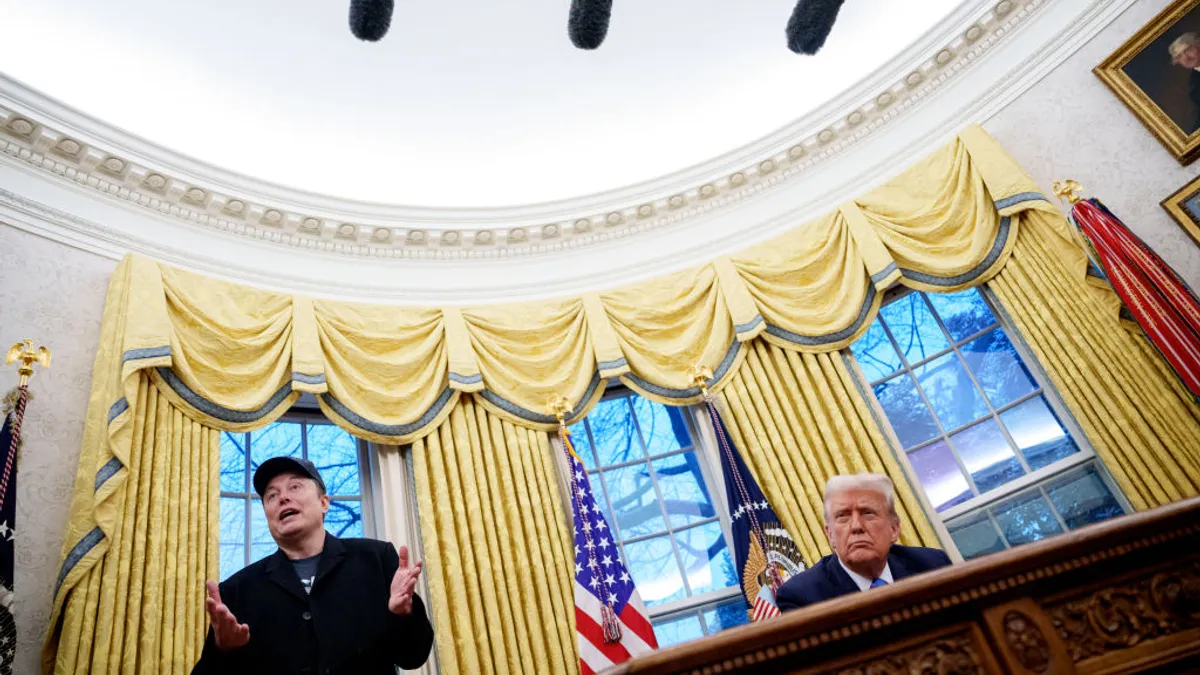The Trump administration has directed federal agencies to “undertake plans for large-scale reductions in force” as part of a sweeping plan to shrink the size of the U.S. government.
The executive order, signed by President Donald Trump Tuesday, instructs agency heads to coordinate their plans with the Department of Government Efficiency, the cost-cutting initiative led by Elon Musk, one of Trump’s closest advisers and the world’s richest person.
Speaking with Trump at the White House Tuesday evening, Musk tried to defend the drastic actions taken so far by DOGE, which has dismantled the U.S. Agency for International Development and effectively shuttered the Consumer Financial Protection Bureau. Claiming his goal is to “restore democracy,” he described the ranks of career government workers as an “unelected, fourth, unconstitutional branch of government.”
The order tasks agencies to prioritize for layoffs all temporary employees and any staff of offices not “mandated by statute or other law.” Additionally, the order aims to put in place a policy limiting hiring to no more than one employee for every four that leave their positions.
The Wall Street Journal and BioCentury previously reported the White House was preparing plans for thousands of layoffs across the Department of Health and Human Services, which oversees the Food and Drug Administration, the National Institutes of Health and the Centers for Disease Control and Prevention.
The executive order Trump signed Tuesday is less targeted and, possibly, less severe than those reported plans, which, according to BioCentury, would have instructed the FDA to halve its workforce.
Employees at the FDA who are funded by industry user fees, rather than federal appropriations, may also be unaffected, depending on how the order’s language around jobs “not mandated by statute” is interpreted. User fees are set in legislation passed every few years by Congress; the current iteration provides funding through 2027.
Neither the hiring policy nor the requirement to draft workforce cuts are applicable to “functions related to public safety, immigration enforcement, or law enforcement.” But it’s not clear exactly what offices or positions are covered by the term “public safety.” The order defines immigration enforcement and law enforcement, but doesn’t spell out a specific meaning for public safety. (Military personnel are exempt from the order entirely.)
Still, the order provides DOGE with substantial power, and could seriously hamper agencies like the FDA that have already been struggling to hire sufficient staff.
It’s also another blow to an ecosystem reeling from DOGE’s plans to curtail funding provided by the NIH to universities and medical centers for scientific and clinical research. Courts have temporarily suspended that plan, which critics, including some Republican lawmakers, warn would risk compromising the country’s scientific leadership. And while the pharmaceutical industry has largely stayed silent, there are signs of growing public opposition.
The Senate is currently weighing Trump’s nomination of Robert F. Kennedy Jr. to serve as HHS Secretary. Kennedy recently secured the backing of the Senate Finance Committee — a key step — despite Democrat and Republican concerns over his views on vaccines and history of sharing vaccine misinformation. A confirmation vote could come as soon as this week.
While Kennedy has spoken more about his plans to address chronic diseases, he’s been an outspoken critic of the FDA and previously told staff there to “pack their bags.”












